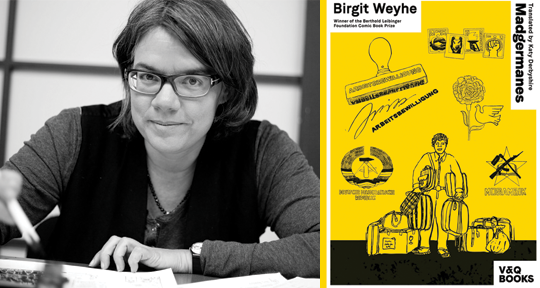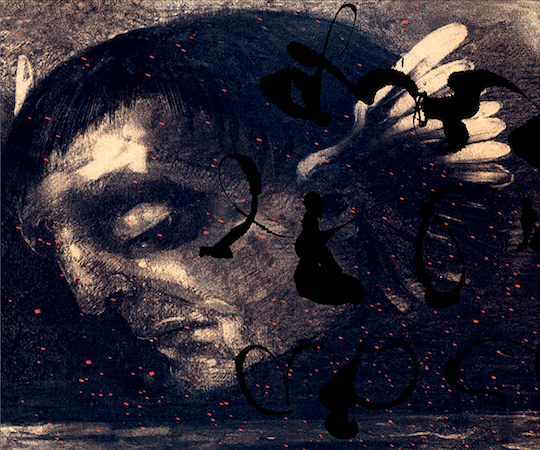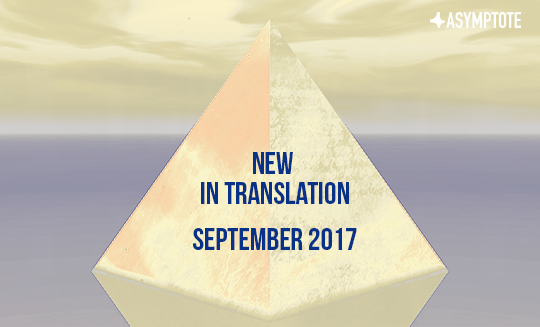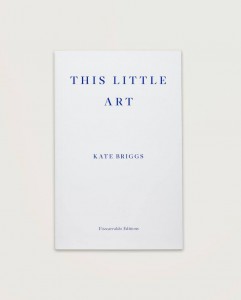Madgermanes by Birgit Weyhe, translated from the German by Katy Derbyshire, V&Q Books, 2021
The story of the Madgermanes, like that of so many displaced communities, is one likely to disappear into the footnotes of a war’s grand narrative. Having achieved independence from Portugal following the Carnation Revolution, the People’s Republic of Mozambique found itself once again thrown into armed civil conflict during the late 70s. Around the same time, in 1978, the German Democratic Republic sought to combat widespread labour shortages by reaching an agreement with the Marxist Front for the Liberation of Mozambique (FRELIMO), which enabled them to contract workers from their heavily indebted socialist sister state. Spurred on by the spirit of independence and tempted by the education and employment opportunities which were so lacking in their war-ravaged homeland, around 20,000 young Mozambican volunteers left East Africa for East Germany. These volunteers would later be labelled the Madgermanes—a concatenated form of “Made in Germany,” used to taunt and belittle those who later returned to Mozambique after the fall of the Berlin Wall.
Memory is a dog in heat . . . there’s no counting on it.
Birgit Weyhe’s Madgermanes is a book of memories. Translated from the original German by Katy Derbyshire, it is infused with all the homesickness, adventure, and exploitation that economic migration entails, hypnotically rendered in black, white, and burnished gold illustrations. Divided into three sections, the graphic novel follows three fictional members of this dislocated community who each recount their experiences, offering a multifaceted perspective on the intricacies of their particular situation, as well as the life-changing repercussions of geopolitics and civil war for the individual. José, quiet and bookish, wants nothing more than to play by the rules of his new German bosses and learn as much as he can, while his roommate, fun-loving Basilio, is more intent on having a good time. Pragmatic Annabella arrives in East Germany three years later than her co-volunteers, driven by the prospect of an education and of sending money home to what remains of her family. She soon becomes aware of the true nature of the volunteer programme when she is assigned a role on the production line of a hot water bottle factory, a far cry from the kind of jobs they were promised.
José, Basilio, and Annabella’s memories are as similar as they are different. Upon reaching Europe, they are all faced with racial exclusion, little agency over their place of work, and economic hardship. The latter remains a direct result of the ‘agreement,’ which saw 60% of the workers’ wages retained—wages which are still yet to be received. Each character is painted, textually and graphically, with their own private passions and motivations for migration, as well as the deep sorrows of bereavement and loss. After the fall of the Berlin Wall, each person reacts to increasing hostility and racial discrimination in their own way—faced with the decision of returning to a home they no longer recognise, or attempting to struggle on in hopes of a brighter future in the new Europe. Commendably, Weyhe seems especially committed to underscoring the intersectional nature of the trauma faced by Annabella; hers is the last of the three stories, and it is arguably the most harrowing, visually portraying the entwined struggles of racism, misogyny, and gendered violence with horror-splashed drawings and unflinching honesty. One is reminded of The Unwomanly Face of War, Svetlana Alexievich’s polyphonic masterpiece in which she collects the memories of hundreds of Soviet women who participated in the second world war. Where Alexievich chose to create many voices, Weyhe has chosen to condense the variant struggles into one, though the effect is no less striking. Through Annabella, we can hear echoes of the voices of many other migrant women—forced to choose between their own agency and bodily autonomy in order to protect their own future and their closest kin.





